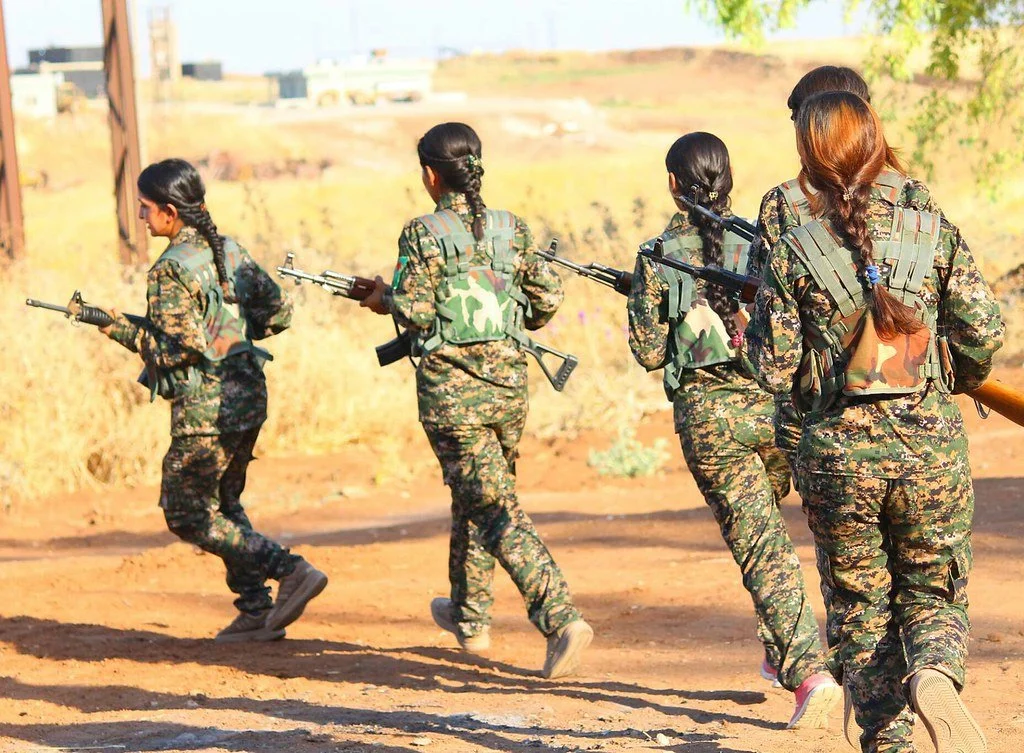The Middle Eastern nation of Rojava has established feminist ideologies within its constitution and continues to be a beacon of feminist-led policies and experiments in communal anarchism.
Rojava, an autonomous region in Northern Syria operates across four countries - Turkey, Iran, Iraq and Syria, though it doesn’t work under these nations’ laws. The region is broken up into three autonomous areas, with community support and feminist ideologies at the forefront. In addition to the creation of an all-women military squadron, Rojava has made it a point to put women at the forefront of community life and operations.
Ideology
In 2012, the Kurdish National Council was established to be the governing body in Rojava. In November 2013, the Council divided the region into three autonomous areas, with an emphasis on having no borders. Rojava’s identity isn’t based on separating regions and establishing a territory within its communities. Rather, it’s based on fighting for the rights of the community members against oppression.
In January 2014, the government enshrined its commitment to the freedom of all peoples into its constitution. Rojava’s ideology revolves around enshrining the rights of its citizens in its constitution. Their nation has since been an advocate for the advancements of their women. Rojava’s treatment of women as equals has had ripple effects for their entire culture, prioritizing women in equal and vital roles within the community.
Rojava has also experimented with a reduced role of government in their citizens’ lives. That’s not to say that Rojava is a libertarian utopia, quite the opposite. Rather, the constitution allows communities to express their own power and influence over their situation. Communities are often governed by two elected chairpersons, specifically one man and one woman. Meetings are held regularly where families collectively discuss issues and how the community runs. Community support is an emphasized part of the Rojava government. Reconciliation committees are formed for civil disputes within the community. Committees are also used for community infrastructure projects, with outcomes coming out of Democratic processes. Essentially, the government’s purpose was to, “serve the citizens and not the owners of capital”.
History
After World War I, the Allied powers who won the war divided up the region of Kurdistan and incorporated it into several already existing countries. The Kurds, who were the civilians in the region, were effectively disenfranchised from their shared cultural identity as the surrounding countries imposed their own culture and oppression on the Kurdish people. With a population of about 35 million, the Kurds are the largest nation of people without a state.
In 1980, the Turkish military orchestrated a coup against the government, and sensing continued persecution ahead, the leaders of the progressive Kurdistan Workers Party (PKK) moved their operations to Syria.
Immediately after the move from Turkey, the organization realized the importance of women as a force for a democratic revolution. Women played very active roles in the formation of Rojava, and 1986 marked the formation of the first women’s organization within the autonomous zone. Seven years later, the establishment of an all-female military unit, the Women’s Protection Units (YPJ), signified the importance of women’s roles outside the home in Rojava. Between 1984 and 1994, Rojava and Turkey sustained a blood-soaked war that ended the lives of 40,000 civilians. Ocelan was arrested and charged with treason and spent 10 years behind bars until 2009.
In the decade between 1984 and 1994, Rojava and Turkey operated a blood-soaked war that cost the lives of 40,000 civilians. Turmoil is still an element in the region today, but Rojava’s ideologies outlasted the leaders of the PKK and have evolved to encompass environmental sustainability and equal rights for everyone.
Contemporary Problems
Some of Rojava’s ambitions, regarding ecological sustainability and equal treatment for all, have fallen short of their proposed ideologies. Rojava is within a region with massive amounts of oil production equipment, which directly contradicts their aspirations for a sustainable power structure. An inefficient power grid only supplies electricity in the morning and the night, leaving citizens to rely on individually-owned generators. Their reliance on fossil fuels leaves no budget to make the transition to cleaner energy.
Rojava’s approach to a limited government comes into conflict when international diplomacy is at stake. Rojava has only one airport,which is operated by Syrian authorities. They are reliant on another state’s airport, which compromises their integrity in condemning a policy that Syria could institute. Rojava’s economy is also extremely behind, relying on agrarian practices. Not only are they reliant on an agricultural economy, but most of their resources also go towards self-defense measures and holding prisoners of war. Nearly 10,000 ISIS defectors and their families are imprisoned within Rojava’s borders, in direct conflict with their egalitarian beliefs.
The ideals of the autonomous Rojava are certainly unique, given their regional geography. However, decades of fighting with oppressive regimes have hindered their ascension into an egalitarian utopia. Their circumstances have proved it difficult to maintain their ecological and state-adjacent aspirations.
Clayton Young
Clayton is an aspiring photojournalist with a Bachelor's in Liberal Studies with a minor in History from Indiana University - Bloomington. In his free time, he enjoys hikes, movies, and catching up on the news. He has written extensively on many topics including Japanese incarceration in America during World War II, the history of violence, and anarchist theory.


